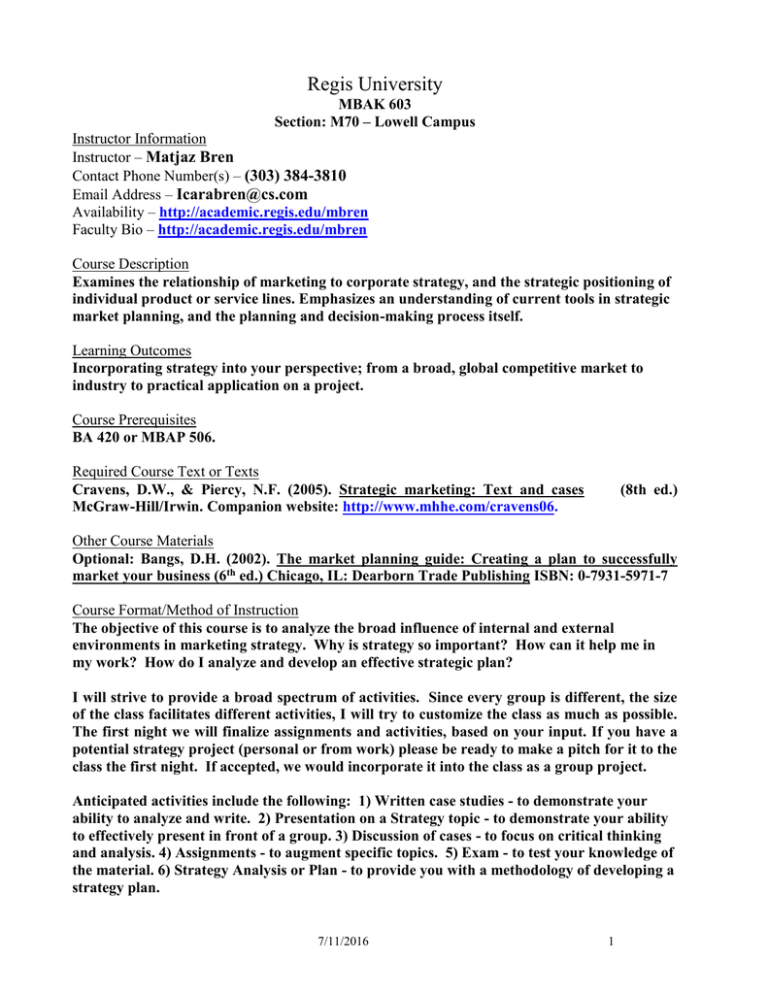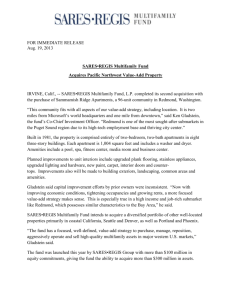Regis University Matjaz Bren (303) 384-3810
advertisement

Regis University MBAK 603 Section: M70 – Lowell Campus Instructor Information Instructor – Matjaz Bren Contact Phone Number(s) – (303) 384-3810 Email Address – Icarabren@cs.com Availability – http://academic.regis.edu/mbren Faculty Bio – http://academic.regis.edu/mbren Course Description Examines the relationship of marketing to corporate strategy, and the strategic positioning of individual product or service lines. Emphasizes an understanding of current tools in strategic market planning, and the planning and decision-making process itself. Learning Outcomes Incorporating strategy into your perspective; from a broad, global competitive market to industry to practical application on a project. Course Prerequisites BA 420 or MBAP 506. Required Course Text or Texts Cravens, D.W., & Piercy, N.F. (2005). Strategic marketing: Text and cases McGraw-Hill/Irwin. Companion website: http://www.mhhe.com/cravens06. (8th ed.) Other Course Materials Optional: Bangs, D.H. (2002). The market planning guide: Creating a plan to successfully market your business (6th ed.) Chicago, IL: Dearborn Trade Publishing ISBN: 0-7931-5971-7 Course Format/Method of Instruction The objective of this course is to analyze the broad influence of internal and external environments in marketing strategy. Why is strategy so important? How can it help me in my work? How do I analyze and develop an effective strategic plan? I will strive to provide a broad spectrum of activities. Since every group is different, the size of the class facilitates different activities, I will try to customize the class as much as possible. The first night we will finalize assignments and activities, based on your input. If you have a potential strategy project (personal or from work) please be ready to make a pitch for it to the class the first night. If accepted, we would incorporate it into the class as a group project. Anticipated activities include the following: 1) Written case studies - to demonstrate your ability to analyze and write. 2) Presentation on a Strategy topic - to demonstrate your ability to effectively present in front of a group. 3) Discussion of cases - to focus on critical thinking and analysis. 4) Assignments - to augment specific topics. 5) Exam - to test your knowledge of the material. 6) Strategy Analysis or Plan - to provide you with a methodology of developing a strategy plan. 7/11/2016 1 You can find descriptions of work and additional information on my Regis site. Please check the site for additional feedback on class assignments and specific comments on the grading of assignments. http://academic.regis.edu/mbren/ Assignments, Course Calendar/Learning Activities WEEK ASSIGNMENTS WEEK 1 READINGS COMPLETED Introductions, Course overview, Course assignments Strategically Managing Projects and Strategy in Business Pitching any prospective class projects WEEK 2 Chapter 1, 2, 3, 4 Interviews (optional for Week 2) → Mission Assignment Due (1 pg assignment anonymous name) WEEK 3 Chapter 5, 6, 7 Interviews & Individual Presentations → Short Case Paper Due - 2 pages max (excluding graphics) Case 6-5 Toyota Pg. 501 (Anonymous name) 1) Update on Lexus in Europe 2) Do SWOT of Lexus in Europe. 3) Your recommendations for Lexus in European market. (I recommend doing SWOT in graphic form). WEEK 4 Chapter 8, 9, 10 Interviews & Individual Presentations → Personal Strategy Due (1 pg assignment anonymous name) WEEK 5 Chapter 11, 12 Interviews & Individual Presentations → Long Case Paper Due - 4 pages max (excluding graphics) Case 5-2 General Motors Pg 453 (Anonymous name) 1) Update GM today 2) What strategy should GM use – why? WEEK 6 Interviews & Individual Presentations Chapter 13, 14 WEEK 7 Strategy Plan presentations (10 min.) Interviews & Individual Presentations Exam WEEK 8 Strategy Plan presentations (10 min.) Evaluations Strategy Plan Paper Due 7/11/2016 2 Grading Criteria As they relate to mastery, each of the letter grades has the following meaning as described in the University Bulletin: GRADE A 100% - 93% A92%-90% B+ 89%-87% B 86%-83% B82%-80% C+ 79%-77% C 76%-73% C72%-70% D+ 69%-67% D 66%-63% D62% - 60% F Below 60% GPA 4.00 = Outstanding Scholarship 3.67 3.33 3.00 = Superior Work 2.67 2.33 2.00 = Unsatisfactory/Graduate 1.67 1.33 1.00= Unsatisfactory 0.6 0.00 Failure Grading Rubric: An “A” grade is characterized by the following attributes: 1. Demonstrates accurate and sophisticated understanding of readings and issues. Draws out important implications . Effectively integrates perspectives, opinions, theories and ideas from outside the assigned material. 2. Shows critical thinking skills expressed articulately with a demonstrated ability to do more than repeat the text material. Defends opinions and judgments effectively. 3. Expresses ideas clearly. 4. Contains few grammatical, syntactical, or stylistic weaknesses. A “B” grade is characterized as follows: 1. Shows all the elements of "A" work, but with less accomplishment, proficiency, or analysis; relies to a lesser degree on materials outside the assigned readings. 2. Asserts a critical position on the issues with a demonstrated ability to do more than repeat the text material. 3. Offers limited defense or explanation of judgments and conclusions. 4. May be missing one or more significant elements in the case. A “C” grade is characterized as follows: 1. Shows an overall grasp of the material, but with little effort or success in defending conclusions or judgments. 2. Reflects sufficient clarity of expression to communicate ideas, but lacks in depth analysis of issues or questions raised in the case. 3. May be missing more than one critical element of the case. Grades of plus or minus reflect variations from the above standards, up or down, which are not sufficient to merit a change in letter grade. 7/11/2016 3 Grade of “Incomplete” The instructor does not give incompletes except in exceptional circumstances. Even then, there must be a significant amount of work handed in to warrant an incomplete. If the incomplete is awarded, a deadline will be given within which the work must be completed. If the work is not completed in the allocated time, the grade will be changed to F. Feedback Assignments will be graded by the next class meeting. Feedback will include your grade for participation for the week, if participation is a requirement. Attendance/Participation Requirements Students are expected to be physically present in class and participate meaningfully in class discussions. Meaningful participation includes arriving on time, fully preparing for class and contributing to class discussion in a way that is informative or generates class discussions on the discussions and activities covered in the class. Absenteeism, tardiness or leaving early will impact participation grades for those weeks since you do not get the benefit of being fully involved in class interaction with other students and contributing to the learning of other students in the class. More than one absence may result in one reduced grade. GRADING DISTRIBUTION 10% Assignments (interview, 1 page papers, misc.) (Anonymous name on papers)* 10% Short Case - 3 double space pg. max (Anonymous name)* 20% Long Case - 5 double space pg. max (Anonymous name)* 15% Topic Presentation: 8 min. 15% Exam 10% Self Evaluation 10% Class Participation 10% Group Written Case: 6 or 10 page max.** 100% **Graphics do not count toward page max ** For individual written cases and the 1 page assignments, I would ask that you not put your real name on the paper, but use an anonymous name. It should consist of two words: Your birth month and a second word of your choice. (January Snow, June Bug…etc) **Charts and graphics do not count toward the maximum page limit, and please do use visual information in your double-spaced papers. Grading will be determined by the clarity of your analysis and your use of concepts, which demonstrate critical thinking. Late work will be marked down 10%. Incorporate class dynamics in all the activities; observe time limitations, understand your audience, and focus on analysis. Oral presentations should be proficient in style (vocal quality, body language, visual aids, etc.) Grading will be based on organization, clear information, use of thought provoking insight, demonstration of analytical skills and general effectiveness. I will give you immediate feedback on oral presentations – if for some reasons I do not, please remind me. Participation will be based on your preparedness, interest and involvement, constructive peer feedback, creative problem solving and your ability to effectively interact to enhance participant learning. 7/11/2016 4 My goals are to help you to reach the course objectives, maintain your interest in this material, provide a wide range of learning methodology, to not waste your time, and to do my best to make this class both informative and enjoyable. ACADEMIC INTEGRITY Regis University is committed to intellectual integrity in its academic pursuits. Conduct such as cheating, plagiarism, forgery, and alteration or misuse of academic records is inconsistent with accepted University standards of intellectual integrity and academic performance. Sanctions may, therefore, be imposed by the programs of the University for cheating (defined as using inappropriate sources of information on a test) or plagiarism (defined as presenting as one’s own, the ideas, words or products of another). Such sanctions may include a failing grade on the assignment, failure of the course or expulsion of the student from the course or the department; sanctions are decided upon and imposed by the program after consideration of the evidence. STUDENT CONDUCT SPS Graduate Programs’ students and faculty share responsibility for maintaining an appropriate learning environment. This includes using information technology responsibly in online and other courses. In order for faculty members to provide and students to receive effective instruction in classrooms, laboratories, online courses, and other learning areas, the Graduate Programs and Faculty expect students to conduct themselves in an orderly and cooperative manner and not engage in disruptive behavior, disorderly conduct or intentionally interfere in the freedom of expression of others. “Disruptive Behavior” or “Disorderly Conduct” as applied to the academic setting, means behavior that a reasonable faculty member or student would view as intentionally or recklessly interfering with normal academic functions, University events or University sponsored activities. Examples include, but are not limited to: persistently speaking or commenting without being recognized or interrupting other speakers; behavior that distracts the class from the subject matter or discussion; or in extreme cases, physical threats, harassing behavior or personal insults; refusal to comply with faculty direction including refusal to work in a group, using a cell phone or pager during a classroom session; or behavior that has a negative impact in any learning environment. Disruptive behavior also includes any other behavior covered by the Regis University Student Code of Conduct. Students who fail to adhere to acceptable behavioral standards will be counseled by the classroom faculty. Should the issue not be resolved, they will then be referred to the Program Chair and then, should it be necessary, to the Dean and may be subject to discipline up to and including expulsion from the program. PLAGIARISM Plagiarism is defined as presenting as one’s own, the ideas, words or product of another. When a student submits work for credit that includes the product, words, ideas, or data of others, the source must be acknowledged by the use of complete, accurate, and specific references, this includes 7/11/2016 5 copying and pasting from online media or from any web-site. By placing one’s name on work submitted for credit, the student certifies the originality of all work not otherwise identified by appropriate acknowledgements. Sanctions for plagiarism include: a failing grade on the assignment, failure of the course, or, expulsion from the course or department (program). An instructor may, at their discretion, utilize the services of Turnitin.com to evaluate the student work product for plagiarism. Alternatively, an instructor may require students to submit the work product directly to Turnitin.com for evaluation prior to submission to the instructor. For more information on Turnitin.com, please go to www.turnitin.com. AVOIDING PLAGIARISM TUTORIAL There are a variety of tutorials designed to help students understand and avoid plagiarism. Please take the time to review the web site provided below. http://highered.mcgraw-hill.com/sites/0072873469/student_view0/avoiding_plagiarism_tutorial/ EQUAL ACCESS & DISABILITY SERVICES Regis University, in compliance with federal guidelines, is committed to equal educational opportunity by assuring otherwise qualified students with disabilities equal access to Regis University programs and activities that are provided to students without disabilities. An otherwise qualified person with a disability is a student who meets the academic and technical standards required for admission or participation in Regis University’s educational programs and activities. Eligibility To ensure the provision of reasonable and appropriate services at Regis University, students with disabilities must identify themselves in a timely manner to the Office of Disability Services (ODS), Room 118B, Life Directions Center, 303-458-4941, disability@regis.edu, in order to receive the requested accommodation(s). Current and comprehensive documentation must be on file with ODS prior to approval of the accommodation. Students may disclose their disabilities and request accommodations at any time during their academic career. However, it is strongly encouraged that students self-disclose their disabilities at the beginning of their academic experience because accommodations are not retroactive. Accelerated courses that are offered in eight week terms are fast-paced and reading intensive. Incomplete grades are seldom granted and are not considered appropriate accommodations. All courses are expected to be completed during the term in which they occur. DIVERSITY At Regis University, diversity is at the core of our faith-inspired commitment to build an inclusive community that values the dignity and contributions of all of our members. Our differences thrive in a learning environment characterized by the Jesuit traditions of mutual respect and the pursuit of 7/11/2016 6 justice, an environment in which our human differences, whether physical or philosophical, are respected. WRITING ASSISTANCE – SMARTTHINKING The School for Professional Studies will provide 10 hours of FREE tutoring or writing assistance for one year for all SPS students through ™SMARTHINKING. The tutoring year begins on March 8 of the current year. To register for ™SMARTHINKING, access INsite at https://insite.regis.edu, login using your RegisNet Username and Password. Select ™SMARTHINKING. REGIS NET A RegisNET Account allows students to use and access Regis University web-based resources. RegisNET provides access to SHAREPOINT, ™SMARTHINKING, free email, course modules and syllabi, Dayton Memorial Library Databases, computer labs, presentation equipment, etc. To register for a RegisNET account, go to INsite (http://insite.regis.edu/). Select “RegisNET Account”. You will be required to post either your social security number or student ID. DAYTON MEMORIAL LIBRARY The Dayton Memorial Library can be accessed http://www.regis.edu/library.htm website The Jesuit University system provides 24 hour research support. The reference desk can be accessed by the link on the site or at 303-458-4031, 1-800-388-2366 Ext. 4031. STYLE SHEET STATEMENT Regis University SPS Graduate Programs requires students use the APA Style Sheet for written assignments. Information can be accessed through: http://www.regis.edu/regis.asp?sctn=ars&p1=ws 7/11/2016 7



